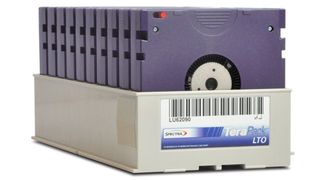There's one crucial way tape still trounces SSDs and hard drives when it comes to storage...
Tapes beat any other media when it comes to price per capacity

Tapes will make sense to those born in the early 80s but magnetic ribbons have long been replaced by shiny disks, silicon chips and cloud-based storage for whoever wants to store data.
But don't discount them yet. Even if LTO-8 tapes are now in stock, you can buy cheap LTO-7, reformat them to M8 and get 9TB of native storage (22.5TB compressed). You can grab one (HPE LTO 7 Tape with Barium Ferrite (BaFe) C7977A) for just under $59, a price that is unlikely to change even on Black Friday.
- Also check out the best portable SSD of 2019
- Looking for something more durable? These are the best rugged hard drives of 2019
- We highlighted the best cloud storage solutions
With an uncompressed capacity of 9TB, it translates into a per TB cost of $6.55, about 12x less than the cheapest SSD on the market and 1/4 the price of the 12TB Seagate Exos X14, currently the most affordable hard disk drive on the market on a per TB basis.
In other words, if you want a LOT of capacity, then tape is the obvious answer (although truth be said, you also need to factor in the cost of the drive).
But there's something else that tape offers that no other storage medium currently offers and that's on-the-fly, transparent compression which can go up to 2.5:1 and works best on text files (rather than multimedia which is already heavily compressed).
As for transfer speeds, they can reach 300MBps (that's 1.08TB per hour) which is plenty fast, just a tad slower than the just-reviewed PNY Pro Elite which tops 375MBps.
Tape that!
Even though tape has a fuzzy retro feeling to it, it is still the preferred, most widely used archiving medium thanks partly to a 30-year archival life and lifetime warranty on most if not all tapes.
Are you a pro? Subscribe to our newsletter
Sign up to the TechRadar Pro newsletter to get all the top news, opinion, features and guidance your business needs to succeed!
The next generation LTO9 will double the native capacity to 24TB (60TB compressed) and LTO10 doubling it again to 48TB (and 112.5TB compressed) when it reach the market from 2020 onwards.
Just bear in mind that the price above doesn't take into consideration the price of an LTO drive which can cost around $3,000 for a bare internal drive so that it only makes sense to get this if you plan any capacity above 140TB.
- These are the best external hard drives of 2019

Désiré has been musing and writing about technology during a career spanning four decades. He dabbled in website builders and web hosting when DHTML and frames were in vogue and started narrating about the impact of technology on society just before the start of the Y2K hysteria at the turn of the last millennium.
